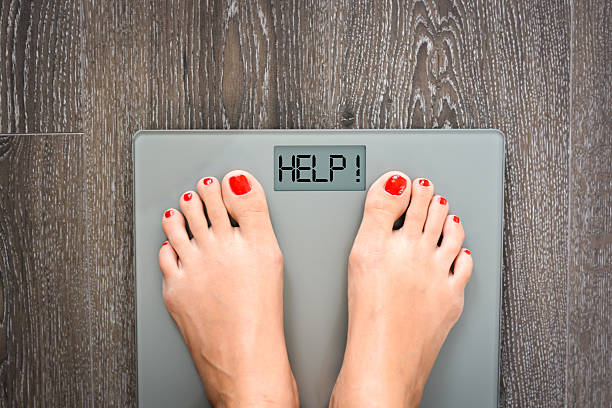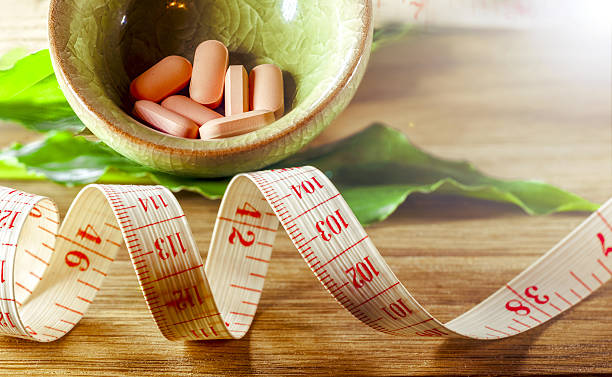Weight gain is a serious problem plaguing the health and vitality of humans worldwide, and research suggests that over 61% of adults in the U.S have gained weight since 2020.
The hunt for effective ways to reduce body weight has led people to several discoveries. While most people may favor exercise and a healthy diet over other options, others choose medication and supplements.
Over the years, several dietary supplements have emerged as plausible solutions to regulating one’s body mass index. Unfortunately, some of these products failed to promote healthy weight loss.
While some products could burn fat and help you shed pounds, the adverse effects outweighed the benefits.
With the inefficiency of herbal remedies and other supplements, people have turned to vitamins to support weight loss. Although all vitamins have health benefits, not all can help you lose weight. The vitamins most associated with effective weight loss are vitamin D and B vitamins.

The reports from the study have encouraged several people to turn to vitamin D and its supplements as the surest way to lose weight. However, vitamin D and its supplements are not magic cures. Thus, these products will take time to work.
With the increased demand for these best weight loss pillss, you may get confused about what vitamins and supplements can help you lose weight. This article outlines the vitamins and supplements that can help you with your weight loss goals.
Conjugated Linoleic Acid (CLA)
CLA is a fatty acid found naturally in dairy and meat products. Some claims suggest that linoleic acid may help with losing weight by keeping you full. Hence, you get to continue your diet goals without issues.
Some researchers suggest that 1.8 to 6.8g of CLA per day may boost muscles and reduce body fat. Moreover, a study has found that CLA effectively prevents weight gain during the holiday season.
However, reports suggest that long-term use of large doses of CLA could lead to insulin resistance, especially for obese individuals. Thus, prolonged use of this supplement could predispose you to type 2 diabetes and reduce the “good” cholesterol in your body. You can research and know more about best weight loss supplements for women.
Some other side effects of using CLA supplements may include nausea, upset stomach, loose stools, and fatigue. Thus, it would be best to consult your physician before using this supplement to avoid health complications. Furthermore, getting CLA from food is a better alternative to retain its benefits while avoiding the potential risks of this compound.
Chitosan
Chitosan is a sugar derived from the hard outer layers of crabs, shrimp, and lobsters. Several dieticians claim Chitosan can block cholesterol and fats from getting absorbed by your body. However, there isn’t enough research to suggest that Chitosan helps with weight loss.
When applied to wounds, Chitosan can enhance blood clotting. People also use Chitosan to regulate high cholesterol levels. The sugar also helps with high blood pressure and replenishes vitamin D in those with vitamin D deficiency.
While Chitosan has no adverse effects, some individuals may experience constipation or upset stomachs. Additionally, you should abstain from Chitosan and its products if you have shellfish allergies.
Chromium Picolinate
Chromium is a mineral that regulates insulin. Insulin is a hormone that helps to turn food into energy in your body. The mineral also helps your body to store fats, proteins, and carbohydrates.
Some researchers believe chromium can increase energy production, shed fat cells, and lower your appetite. The mineral supplement may also boost your muscle mass and increase your chances of losing weight. However, you must consume less than 35 micrograms of chromium daily.
Higher doses of chromium could lead to irritability, headache, insomnia, and a decline in mental health. Additionally, some people may experience kidney damage if they use chromium.
Green Tea Extract
Green tea supplements work by raising calorie intake and fat metabolism. The product can preserve lean body mass, affecting your body weight and composition. Additionally, the product helps to decrease your appetite by keeping you full to prevent excessive food intake.
Although green tea extracts have potential benefits, high intake could lead to nausea, vomiting, gas, and bloating. Excessive intake could also lead to diarrhea, insomnia, dizziness, and agitation. Thus, you should always consume this product in regulated quantities to avoid adverse effects.
Glucomannan
This supplement derived from the konjac plant prevents your body from absorbing fat consumed in food. Furthermore, it is more advisable to consume this product in powder or capsule form is more advisable. You could choke or experience a blockage in your throat, intestine, or esophagus if you consume the tablet form of glucomannan.
Another disadvantage of glucomannan is that it could make it more challenging for your body to absorb medication. Hence, it would help if you took your medicines an hour or four hours before using this dietary fiber.
Guar Gum
Also called guaran, Guar gum comes from a legume called Guar beans. The product contains several carbohydrate molecules made of two sugars: galactose and mannose. You can also find the product as an additive in several processed foods.
Guar gum is essential in manufacturing due to its solubility and ability to absorb water, and this ability allows Guar gum to form a gel that thickens and binds products. The Food and Drug Administration (FDA) considers Guar gum safe for consumption in regulated amounts.
Guar gum has a low-calorie composition and mainly contains soluble fiber, and the gum has a protein content that may range from five to six per cent. Due to its composition, the product potentially prevents your body from absorbing fats and helps you feel full. Hence, you can keep track of your fitness goals without eating excessively.
Researchers have studied Guar gum much more than other fibers for weight shedding, and several feel the product does not work. Furthermore, the side effects of consuming Guar gum may include diarrhea and gas.
Green Coffee Extract
Like green tea extract, green coffee extract also helps with obesity. The green coffee extract comes from regular coffee beans, which do not undergo roasting and remain raw.
You can obtain green coffee extract as a dietary supplement and as a whole bean which you can use to make hot beverages like roasted coffee. However, you must note that the extract tastes nothing like the regular roasted coffee you normally consume.
The extract contains chlorogenic acids, which have antioxidant and anti-inflammatory properties. Some small studies on mice suggested that the product significantly reduced body weight and fat accumulation. However, studies on humans haven’t yielded many results and remain inconclusive.
Although science is yet to prove that the product can help you lose weight, the green coffee extract also has other benefits. The product helps to reduce the risk of heart diseases. Furthermore, the chlorogenic acids in the product help to regulate your blood sugar levels, thereby preventing diabetes.
A study on people with metabolic syndrome showed promising results. According to the results, people who consumed the extract enjoyed improved fasting blood sugar and waist circumference compared to the placebo. However, scientists need more studies to conclude these findings.
Although green coffee extract may not harm you, you may experience some potential risks. Excessive use of this product could lead to negative symptoms like sleep disturbances and anxiety. Thus, you should always moderate your intake of green coffee extract to avoid these side effects.
Continuous usage of this product may affect bone health. A study found that daily product doses affected calcium levels in bone tissues. Although there is no result on humans, these findings suggest that excessive green coffee may cause more harm than good.
Other potential side effects include abnormal heart rhythm, headaches, nervousness, and insomnia. It would help to consult your physician before using green coffee extract to avoid these adverse effects.
7-Keto-DHEA
7-keto-DHEA comes from dehydroepiandrosterone (DHEA) in your body, and DHEA is a primary hormone secreted by glands near your kidney. Unlike DHEA, 7-keto-DHEA does not convert to steroid hormones like estrogen and androgen. Hence, consuming 7-keto-DHEA or applying directly to the skin does not heighten steroid hormone levels in the blood.
While there is no good evidence to back up the claims, people consume 7-keto-DHEA for muscle strength, obesity, depression, anxiety, and other conditions. It is thought that 7-keto-DHEA promotes weight loss by increasing the body’s metabolism. The increased metabolism leads to the conversion of more energy which burns the fats the body absorbs from several foods.
Several small studies show that people who combined 7-keto-DHEA with a reduced-calorie diet and moderate exercise lost more weight than those who were on a placebo. However, there is still not enough evidence to conclude that 7-keto-DHEA reduces weight gain.
Hoodia
Hoodia is a cactus-like plant that grows in the Kalahari Desert in Africa. Several people use Hoodia to regulate their appetite, thus increasing their potential to lose weight. Other claims show that African San Bushmen eat Hoodia to curb hunger during long hunts.
However, you need to take care when buying hoodia products to avoid getting scammed. There are several reports that some samples of the product sold on the internet do not have any Hoodia. Furthermore, the U.S has banned the sale of a certain product (P57 Hoodia), which contains sibutramine, as it can increase heart rate and blood pressure.
The P57 Hoodia potentially reduces feelings of hunger. However, it is not yet clear how P57 causes this hunger-reducing property. Furthermore, gordonoside F is another chemical in Hoodia thought to decrease hunger feelings by increasing insulin production.
Although Hoodia may seem to have several benefits for overweight and obese women and men, there is no solid evidence of its efficacy. Hence, you may need to consider several factors before using this product to promote weight loss. Firstly, you need to assume that the product may contain harmful substances; in that case, you may have to consult your medical practitioner before using it. Also, because you do not know its composition, it is advisable not to use this product if you are actively on medication.

Ephedra
Ephedra is a stimulant herb usually obtained from the branches and stem of Ephedra sinica. Several ephedra species have a chemical called ephedrine. However, the U.S has banned the sale and use of ephedrine within its borders.
The ephedrine found in ephedra has the therapeutic effects relied upon for weight loss. However, ephedrine is also a source of serious concern regarding the safety of the consumer, as it stimulates the nervous system, heart, and lungs.
Several people use ephedrine for athletic performance and weight loss. Alternatively, some people use the product for nasal congestion, allergies, asthma, headache, common cold, and several other conditions. However, there is no scientific proof to support these uses. Not to mention that ephedrine is unsafe for consumption, as earlier stated.
Athletes who use the product to boost athletic performance stand a chance of disqualification because the product is on the International Olympic Committee (IOC’s) banned product list. Note that ephedra is not Mormon tea. Mormon tea is a product of Ephedra nevadensis, a species of ephedra that does not contain ephedrine.
Ephedrine resembles several artificial compounds present in some drugs, like phenylpropanolamine and pseudoephedrine. The FDA banned ephedrine use because it causes severe side effects, including stroke, heart attacks, arrhythmia, and psychosis. However, the ban does not include herbal teas or Chinese remedies. According to the FDA, no evidence links herbs to weight loss except on a short-term basis. Additionally, the FDA suggests that the side effects far outweigh its health benefits.
Bitter Orange Juice
Bitter orange (Citrus aurantium), also called Seville orange and sour orange, is a citrus fruit with several uses. Most people commonly use the fruit in complementary medicine, foods, and toppings like marmalade and herbal weight loss supplements.
Although most people believe it originated from Southeast Asia, you can now find bitter orange throughout Europe, the South Sea Islands, the Caribbean, South and Western Africa, and Latin America. The fruit fares well in subtropical regions but can withstand adverse environmental conditions.
Bitter orange contains some vitamins and minerals and other compounds usually extracted to make dietary supplements. The fruit contains certain vitamins like vitamin c and b vitamins. You will usually find the fruit processed extracts as p-synephrine, sold in capsule form as a herbal weight loss supplement. Some of the common names for these supplements include Advantra Z and Kinetiq.
The plant compounds in bitter orange, also known as protoalkaloids, have been featured prominently in skin care, weight loss, athletic performance, brain health, and appetite control for over 20 years. Below are the major compounds you will find in the fruit.
Synephrine (P-synephrine)
P-synephrine is the major extract from bitter orange, and it has a similar structure to ephedrine.
P-synephrine is also structurally identical to your body’s fight or flight hormones (epinephrine and norepinephrine). These hormones increase your heart rate. However, there is a concern for this product’s safety considering its similarity to ephedrine and the body’s fight or flight hormones. However, several studies prove that bitter orange extracts and their natural uses do not harm your heart and nervous system. The plant extract also does not excite nerve function like other stimulants.
You can also find p-synephrine in other citrus fruits and juices, including clementine and mandarins. These compounds have good vitamin composition, allowing them to influence certain metabolic reactions.
Limonene
Bitter orange contains Limonene like other citrus fruits, and Limonene has anti-inflammatory properties. Additionally, the compound has certain properties that help your body fight against viruses.
Certain studies suggest that Limonene may prevent colon cancer. However, scientists still need more research to conclude its cancer-healing properties. Another active study is exploring the use of Limonene to treat COVID-19. However, there is no substantial scientific proof to back up this claim. Thus, you should be aware that the compound does not cure or prevent COVID-19.
Octopamine (p-octopamine)
Another protoalkaloid you will find in bitter orange is p-octopamine. However, this compound exists in negligible quantities in bitter orange extracts. Moreover, octopamine may be metabolized quickly in your liver when absorbed from the whole fruit. The compound does not seem to have any adverse effects or benefit weight loss.
Other Compounds Found in Bitter Orange
The leaves of the bitter orange plant contain vitamin C, an antioxidant, and the peels contain high levels of flavonoids in them. These flavonoids are potent antioxidants that have high medicinal value.
Antioxidants also protect your body from diseases by preventing damage to your body cells. These antioxidants work by deactivating free radicals (unstable compounds) that cause damage to your cells, thereby increasing your body’s inflammation and disease risk.
After considering the components contained in bitter orange, the question remains, does bitter orange help with weight loss? Citrus varieties, including bitter lemon, show certain potential for weight loss. However, there is no substantial scientific evidence to back these claims.
Several weight loss supplements use bitter orange extracts with other ingredients. However, scientists are yet to determine the composition of these supplements and how they support weight loss.
One notable compound is p-synephrine which increases fat breakdown. The compound also raises energy production and expenditure while mildly suppressing appetite. All these characteristics may lead to weight loss. Yet, these effects occur at higher doses which may cause safety concerns.
What Vitamins Can Actively Help You Lose Weight?
Several vitamins and minerals can help with weight loss. Most people looking to lose weight are on limited diets. Hence, adding the right vitamin supplements to an effective diet can provide the right boost to help you stay on track to shed some weight.
For example, you can use vitamin B-complex for fully functional metabolism. The major function of the vitamin B complex is to help your body metabolize proteins, carbohydrates, and fats. Furthermore, these vitamins help your body to increase energy levels by using the stored energy in food. You can find them in food sources like egg yolks, fortified milk, soy milk, lean meat, whole grains, and others.
It is not hidden knowledge that you can get your body’s vitamin D supply from sun exposure. However, most individuals tend to spend more time indoors. Others live in climates where the sun may not always shine. Hence, getting the natural source of vitamin D to keep up low vitamin D levels becomes an issue.
For such people, Vitamin D supplement use has become essential to help improve vitamin D levels in their body. According to a study, adequate serum vitamin D may also help to prevent depression. Furthermore, an improvement in the overall mental health of an individual can enable them to maintain a healthy weight as well.
Researchers have found a lower-than-normal vitamin D status in obese individuals. However, the role of vitamin D in weight loss is still unclear. A 2011 study reported that obese and overweight people taking vitamin D and calcium supplements lost more stomach fat than other people not taking these supplements.
Although sunlight is the ideal source for all the vitamin D you need, you can also use several food sources to get yours. Multiple nutrition journals suggest consuming fatty fish, egg yolk, and cod liver oil, among other sources. These sources may not provide quality vitamin D like sunlight, but they help to do the job.
Minerals For Weight Loss
Iron helps your body to produce energy from nutrients. It is also an essential nutrient that transports oxygen throughout your body via red blood cells, including your muscles. This oxygen transportation helps to burn fat. Furthermore, iron deficiency can lead to anemia. Consequently, iron deficiency can reduce athletic performance and physical endurance. The lack also affects women’s health. You may have to talk to your doctor about iron supplements if you experience iron deficiency.
You can get more iron in your body from lean meats, beans, shellfish, and spinach. A balanced diet rich in iron and vitamin C can help absorption.
Magnesium boosts your body’s energy production. The mineral acts as a cofactor with more than 300 enzyme systems, and these systems control several processes like blood glucose and pressure. Furthermore, magnesium helps to keep your bones strong while keeping your nervous system active and functional.
Several people in the U.S use magnesium supplements to boost their magnesium levels. However, you can obtain the best magnesium from nuts, legumes, seeds, and leafy green vegetables.
What Food Sources Can Help One Lose Weight?
Several foods can help an individual looking to shed some weight. Whole grains are good sources of vitamins that help you stay on track while shedding weight. Also, you can eat more fruits and vegetables for a successful weight loss regimen.
A journal of clinical nutrition suggests that a good diet with some vitamins can help you stay on track. However, you must understand that there is still no scientific proof linking weight shedding to food intake. Hence, you may have to consider exercising using these foods and supplements.
Vitamin D is also linked with shedding some weight. However, we have not found any scientific proof to support these claims. The most outstanding source of vitamin D is sunlight. If you cannot use sunlight to obtain vitamin D, you may choose to consume fish, cod liver oils, and other sources to get alternative vitamin D for your body.
Another vitamin worthy of note is the vitamin B complex. Although not directly linked to weight shedding, these vitamins help in multiple vital functions, including metabolism. Hence, sufficient levels of vitamin B in the body may trigger higher metabolic rates. Consequently, the higher metabolism leads to fat loss, which causes individuals to shed some weight. You can find vitamin B complex in green vegetables, meat products, organ meats, salmon, and eggs.

Conclusion: Which Vitamins Can You Take For Weight Loss?
In our article, we have considered several vitamins that may help you shed some weight. The foremost vitamin we listed in our review is vitamin D. You can obtain vitamin D from natural sunlight. However, some people live in climates with low or minimal sunlight. For such people, certain food sources can help them to keep track of their vitamin D body levels. A clinical nutrition journal suggests using food sources like cod liver oil, egg yolk, and others to obtain high-quality vitamin D for your body.
We also considered several other supplements and products that have several links with fat loss in our body. These products include Chitosan, chromium picolinate, conjugated linoleic acid, glucomannan, green tea, green coffee extract, guar gum, Hoodia, ephedra, 7-keto-DHEA, and bitter orange. There are several reviews you can have a look at like phen q reviews & exipure reviews.
We agreed that these products had no scientific backing linking them directly to weight shedding. However, these products triggered certain reactions that helped individuals shed some weight. Ultimately, we also found that some of these products had several adverse effects. Some of these negative effects far outweighed the benefits. Hence, we would not advise anyone to try these products without consulting their physician.



